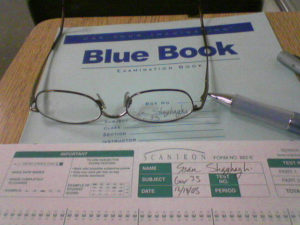Preparing for Final Exams: What to Expect
Final exams week can be frustrating and exhausting when you’ve not prepared properly, Studying and preparing for final exams, though, can be less of a hassle. You can go into your exams feeling confident, not only that, but you can also improve your grades.
“Study early, I would suggest four to six weeks before and to block out time every week to study for each course,” said Debbie Kuchmas, the Retention and Job Development Associate for General Studies, who also helps advise graduating students.
“Study! I would have to say during the semester to study a little each day so that you don’t cram. Talk about the material with family or friends each day and then it’ll become ingrained in your very being,” said Yotisse Williams, a teacher in the Early Childhood Laboratory School.
The first tip to preparing for final exams is looking on your calendar to see how many days you have to study before the exams so you can schedule in days to study.
The next tip is making extra time for studying by putting off social obligations so you can concentrate more.
Knowing what the exam will be on makes it easier to organize your study time. It’s important to know the way your professor makes up your final exam because you’ll be using resources given to you by your professor on what will be covered on the exams. For example, some professors use study guides, review questions, or a sample of the exams in order to give students ideas on what kind of questions the exam will be about.
Another way to study is with a study group which will work if the students you are studying with are as dedicated to studying as you are.
The most effective way to study is by doing review questions with your professor because he or she is most likely to offer tips on how to study, review problems on the exam, or give sample questions. If your professor allows you to bring notes to class on exam day, make sure your notes are in good condition. For example, notes that are organized, notes which you can test yourself from, and notes that include examples of test questions.
Pace yourself by breaking down the questions and approaching each exam question as though it were separate from the rest. When answering questions, remember that the professor will grade you on how well you develop and explain your answer not just how correct it is.
“Study! Study! Study! go over and review materials. It depends on the professor and the subject, some of the professors give you preview questions. “I usually use books, read, and sometimes I use flashcards,” said Urszula Lamorski, an HCC student.
Another HCC student, Meredith Hidalgo, said, “I think students can prepare for finals in the first day of class because it’s impossible to learn everything in the last week. It’s difficult when you didn’t pay attention in class.”
HCC Student Ashton Sneed had another tip: “Review all your notes from class and create a study guide for yourself that’s easy to understand, then make sure you go over everything for two hours minimum every single night.”
Prepare for finals in advance, so you don’t wait until the last minute to study.
